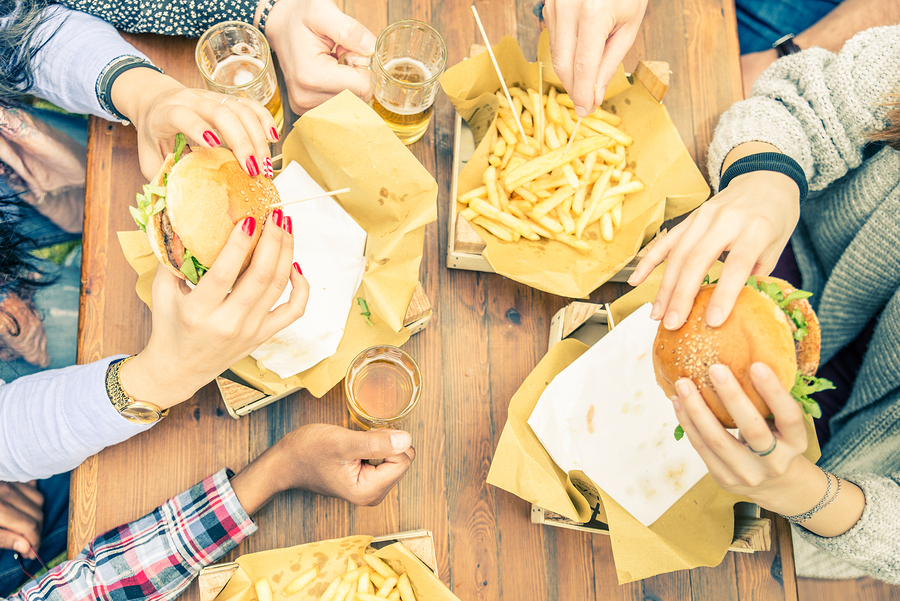Whether it is at family mealtimes or holiday gatherings, food has the power to bring loved ones together and can be an enjoyable experience. Food is essential for fueling and nourishing the body so that humans can lead long and healthy lives. However, when too much food or unhealthy food becomes a way to deal with social and environmental stressors, it can have detrimental health effects on the body. When individuals do not listen to hunger cues and use food as a coping mechanism for difficult moments, these destructive behaviors can ultimately lead to food addiction.
What is Food Addiction?
Individuals who are addicted to food display similar signs of someone who is addicted to drugs or alcohol. Food becomes a pleasurable experience for individuals and they often continue to seek foods, especially ones high in sugar and fat, to satisfy their palates even without hunger cues. Food addiction can ultimately lead to weight gain and other health problems associated with obesity.
Both normal weight and overweight individuals struggle with food addiction. In many cases, individuals diagnosed with bulimia nervosa or binge eating disorder show greater signs of being addicted to food.[1] They often engage in binge eating episodes and feel as though they have lost control of the situation. People diagnosed with bulimia nervosa or binge eating disorder use food as a coping mechanism and may exhibit hidden eating behaviors such as binging and purging.
Signs and Symptoms of Food Addiction
Recognizing the signs and symptoms of food addiction can help you or someone you love seek treatment to overcome the addiction.
- Continue eating even if no longer hungry
- Eating in private
- Eating a large amount of food until uncomfortably full or sick
- Finding ways to get the desired food
- Always thinking about food and have difficulty concentrating on tasks
- Withdrawing from friends and family to eat food
- Spending a lot of money on food
- Withdrawing from previously enjoyed activities to eat food
- Fear of overeating in front of friends and family
- Having difficulty with daily responsibilities in home, school, or work because of food
- Feelings of hopelessness or guilt surrounding addictive behaviors to food
- Exhibiting low levels of self-esteem and self worth about body image and weight
Health Consequences of Food Addiction
When individuals are addicted to food, not only does it consume their entire lives, but it can also lead to lifelong health problems. In most cases, individuals who are addicted to food are craving junk foods, especially ones high in fat and sugar. Sugar becomes a very addictive, but short-term pleasurable feeling that stimulates the brain to seek more. Always craving food and engaging in binge eating episodes can cause weight gain and obesity.
Examining the health consequences of food addiction is vital in ensuring that individuals understand the lifelong effects food addiction can have on health livelihoods. Seeking effective treatment for you or someone you love can prevent the following health consequences of food addiction:
- Insomnia
- Malnutrition
- Heart disease
- High blood pressure
- Diabetes
- Kidney/liver damage
- Fatigue
- Muscle pain
- Osteoporosis (brittle bones)
- Headaches
- Stroke
- Digestive problems
- Arthritis
- Respiratory problems
- Reduced sex drive
Psychological Effects of Food Addiction
It is evident that food addiction impacts physical well-being, but it can also lead to an array of mental health related symptoms and disorders. Struggling with the constant images of the ‘perfect body’ and environmental stressors can cause individuals to feel endless amounts of shame and guilt for their poor eating behaviors. The following are the psychological effects food addiction can have on mental health:
- Feelings of intense anxiety
- Feelings of hopelessness or worthlessness
- Panic attacks
- Distorted self image and low-self esteem
- Depression
- Constant feelings of guilt and shame
- Suicidal thoughts/attempts
Hope for Recovery
If you or someone you love is suffering from food addiction, there is a team of professionals waiting to help you every step of the way. Eating Disorder Recovery Specialists are trained to help individuals suffering from food addiction, an eating disorder, or a co-occurring disorder find a healthy and fulfilling balance. With the use of research based techniques such as Cognitive Behavioral Therapy (CBT), Dialectical Behavioral Therapy (DBT), and self soothing strategies, individuals will learn to overcome their food addiction by fueling their spirit with good health and positivity.
Greta Gleissner is the Founder of Eating Disorder Recovery Specialists, a nationwide network of eating disorder treatment specialists that provide meal coaching and recovery skills such as CBT, DBT, ACT, MI, etc. EDRS works alongside treatment programs, teams and families to provide transitional aftercare support for post-residential treatment clients.
[1] https://www.ncbi.nlm.nih.gov/pmc/articles/PMC3207274/pdf/fpsyt-02-00061.pdf

